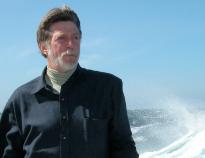OOI Mapping Cruise 2008
Theater in the Round
Only Water Lies in Every Direction
There is something deeply spiritual about working day in and day out on the ocean, no land in sight. The horizon, stars, clouds, wind and waves, and the other sailors/scientists are constant companions. On a research vessel on the open ocean only water lies in every direction; the horizon is a perfect circle.
The struggle to accomplish some goal in the face of overwhelming, if inconstant, sea power is common to all who enter this world. For centuries, sailors have faced this power; some have been lost, many survived, and all have been changed. And for the past 200 years, a small fraction of our population has gone to sea for long periods of time simply to find out how the oceans work.
Ancient Rhythms
Early morning, the surface of the ocean is placid, the breeze caresses, the waves are gentle; we are lulled by ancient rhythms. Later the same day, the same ocean can become a raging force, pounding, searching out every weakness in the little cocoon of survival we call our ship. Reactions vary among sailors. Some pray, others shrug, saying “what happens, happens.” The best are prepared for the worst and enjoy the rest.
Poets and Scientists
Poets and scientists alike are powerfully drawn to the sea. Why? In part, because it is our nature to ask questions, to seek answers, to explore. We design experiments or craft poems that might illuminate some piece of the great mystery. We ask...how do the myriad pieces of a planet-scale oceanic system fit and function together? Can a small change in a single “insignificant” component somewhere result in large-scale, unpredictable, devastating downstream consequences, like a tsunami, or a magnitude 4 hurricane? Can we identify tiny changes that presage destruction?
Some of us search for these answers by putting to sea; a number of us love the life on a research vessel with an inarticulate passion that might embarrass us if we could honestly express it. The camaraderie, the laughter, the hollow look of sleeplessness, exhilaration, exhaustion, the sheer joy of a stunning sunset, the play of the northern lights, a series of massive waves breaking to the shriek of the wind.....the flare of someone’s temper.
Working at the Edge of Knowledge
We address our questions, design new experiments, continue measurements set in motion long ago, imagine new designs guided by earlier failures. Working at the edge of knowledge, it is as if we operate along the boundary between light and darkness, between knowledge and ignorance. There is not much known about what’s left to be discovered about our world...about ourselves. All of the hardships fall away like the outer petals of a rose when discovery happens, and we are confronted with something beautifully new.
The advent of new technologies like live HDTV, satellite linkages, and the Internet under the sea will soon allow sea-going scientists to routinely bring these experiences into laboratories, classrooms, and living rooms across the world. We scientists approach this idea of live communications from the sea with some temerity, recognizing that anything can go awry and much already has, that at sea we are an improvisational theater-in-the-round, that the ultimate director is not Shakespeare, but the ocean. At sea, the horizon always delivers surprises; the play must be perpetually rewritten, even while it is happening.
Welcome to our theater in the round.
Related Content
Voices
- Newbies, Oldies and 21st Century Oceanography
- Going to Sea
- Once and Future Oceanographer
- The Oceans: Medicine Chest for the World
- When Your Home Bobs
- Seas of Opportunity
- Voices of the Fishes
- Oceanography as an Opportunity to Contribute
- The Water Column
- Ocean Heritage Guides this Oceanography Major
- Theater in the Round


